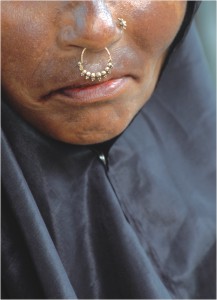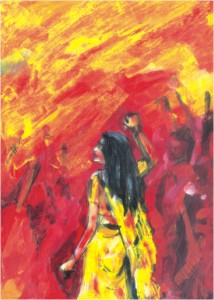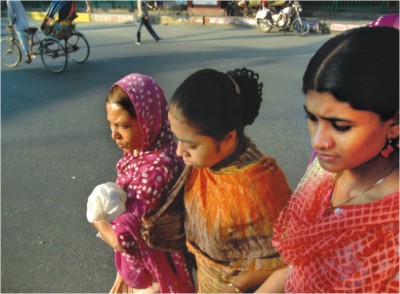
Inside
|
What has changed? Rubaiyat Hossain asks difficult questions about women's emancipation in Bangladesh In the struggle for survival we tell lies. To bosses, to prison guards, the police, men who have power over us, who legally own us and our children, lovers who need us as proof of their manhood. There is a danger run by all powerless people: that we forget we are lying, or that lying becomes a weapon we carry. I want to reiterate that when we talk about women and honor, or women and lying, we speak within the context of male lying, the lies of the powerful, the lies as false source of power. Women have often felt insane when cleaving to the truth of their experiences. Our future depends on the sanity of each one of us, and we have a profound stake, beyond the personal, in the project of describing our reality as candidly and fully as we can to each other.
Not long ago, I was watching a talk show called Agamir Kontho on BanglaVision. The topic was women's participation in the workforce. However, the discussion evaded dialogues about women's freedom and rights, and revolved around the challenges that occur in families and society at large, when women become part of the public sector. This highlights a very important social attitude of Bengali patriarchy, and that is when women's social and cultural position changes because they have stepped out from the andarmahal, we initiate a social and moral debate about whether or not it is okay for these women to do so. Further more, this whole charade is defined as the women's emancipation project. Take for instance, the Agamir Kontho episode on women in the workforce. Supposedly, it was to be a show where women speak up about their challenges of juggling home and career, however, the show turned out to be a discussion with a rather patronising moderator about getting men's opinion and permission to let women take part in the work force. A few male students in the audience said: "If my wife can be a good homemaker then I don't have any problem with her going out and working." Women are individuals and not means to others. They do not need to be permitted to go to work by immature men on patriarchal TV shows! However, the irony remains: by presenting a TV show like this, we believe that, we are participating in a project of women's emancipation! This phenomenon is reminisce of eighteenth century essay competition on topics like "Female Education" where Bengali men took part, gained prizes, and believed themselves to be a part of the female emancipation project! Really, over a hundred years down the road from Begum Rokeya, what exactly has changed? We still live in a social setting where patriarchal values decide the extent to which a woman will be liberated. Yes, she can go to work, but she needs her in-laws' and husband's permission, yes, she can wear jeans, given her husband permits, yes, she can stay out late, given her husband will also stay out with her, yes she can drink, given her husband will pour it for her, and the list can go on. This new modern twenty first century woman, just like her comrades in colonial Bengal, is emancipated within the bhadramahila parameter, the only difference is that now she has been turned into a sexual commodity and brainwashed to believe that, the whole process of commodification has been emancipating and empowering. Girls are starting to become sexual objects from a very early age, and being "sexy" has become something very important, empowering, and a precondition of women's success. Becoming the most desirable sexual object with shiny tan skin, flat tummy, and straight hair has become the goal for today's women. In Bangladesh, women today are more conscious about how they look, what they wear, what they eat, and how much they weigh, than they were even ten years back. Women have been fed this message very, very clearly over the past decade that, however successful or educated one might be, one's looks and sex appeal comes first. No woman in today's world is allowed to carry body fat and appear unattractive, she has to be pretty and sexy in order to win the race.
In Bangladesh, with the micro-finance hype, women's participation in the Union Parishad, RMG sector, and finally the token representation of women in the parliament have created a social backdrop where it's believed that, the women's problem has been sufficiently dealt with. In reality, there has never been a systematic social and cultural discourse to change the definition of socially constructed "Bengali woman." The NGO activities providing women with primarily legal aid, healthcare, and micro-finance persistently refuses to go deep into Bengali patriarchy to challenge the social norm; rather, they target dowry, child marriage, acid violence, rape on a very surface level, ultimately failing to create a long lasting impact on women's lives. The overall process of political pseudo-Islamisation in Bangladesh has created yet another trope for using women as the battleground of ideology. Ali Riaz argues that Islam (more precisely, pseudo-Islamism) has been consciously used as a tool in Bangladesh to earn public consensus as the state ruling bloc failed to come up with an ideology suited both for the elites and the mass. Using state repression to force gain a dominant hegemonic power structure has been common in Bangladesh. The Non-Muslim and Tribal community in Bangladesh faced systematic violence after the 2001 election. The violence was inflicted by the ruling bloc with the intention of homogenising an ostensibly Muslim polity as well as gaining economic benefits by abstracting property from the Non-Muslim and Tribal community. Women were targeted as a sexually vulnerable group in the backlash against Non-Muslim and Tribal groups after the 2001 election. Even in the recent battles of politically and economically motivated pseudo-Islamists against the Non-Muslim, Tribal groups, NGO workers and other secular forces, women become the contesting ground for establishing a superior ideology. Fatwas have been used by local mullahs to establish a superior ideology based on their inadequate knowledge of the Islamic scripture. Women are the prime targets for humiliating and brutal fatwa verdicts. Thus, women's bodies become the displaying ground of the power and legitimacy of the new ruling bloc. Women's behaviour, social appearance, reproductive rights, sexual rights, economic rights -- all become susceptible to a new set of revisions based on the ruling bloc's interest, and their subsequent, and often inaccurate interpretation of pseudo-Islamic sanctions for women. The "politicisation of sexual violence" in Bangladesh creates a ground where "women's bodies once more became the sites and symbols of a variety of battles." Use of female sexuality for the purpose of creating an alternative modernity, and establishing the legitimacy of a politicised pseudo-Islamist authority, and finally the strategic abuse of women's sexual vulnerabilities, yet again establish women as a domain upon, which Bangladeshi nationalism attempts to validate its authority. The politics of pseudo-Islamisation in Bangladesh, thus, creates a greater scope for the removal of women's agency from the socio-political narrative of national politics. Critically looking at women in India, Pakistan, Iran, Afghanistan, Iraq, and Egypt can illuminate the incessant trap that women have been caught into between colonialism and nationalism, imperialism and patriarchy, and Western modernising efforts versus "traditional" often Islamic hubs of resistances. Women in Bangladesh are also caught in similar traps, only no one is taking notice of it yet, because somehow there is an overall believe that, Bangladesh would never turn into a state whose primary moral and social idioms are decided by Sunni Islam. However, the risks are not merely negligible since the root of religious nationalism has been a part of our political past as Bengali Muslims for about over a hundred years now. As Bengali women we already carry the burden of the bhadramahila tight skin imposed on us by the Bengali nationalist struggle against British colonial rule. It might be useful to recap on the construction of Bengali womanhood to realise the immense weight of cultural symbolisation we have inherited from our foremothers. It was under the back drop of colonial political economy and the exchange between the British and the Bengalis about nationalism and modernity, that the bhadramahila was socially constructed. The new woman under the new patriarchy was ready and equipped to uphold the inner realm of national sovereignty by acting as the perfect sahadharmini for the modern Bengali bhadralok.
We Bengali women today cling to this mark of respectability, to this title of bhadramahila. We don't smoke or drink in public, we conceal our sexual histories, and finally we never get around the corner to explore our lives as independent individuals with free flowing dreams, rather we tailor our dreams and pursuits to the societal norm of getting married and playing a certain wifely role. Just the other day I met a woman who was applying to doctoral programs to Harvard, Johns Hopkins, and Columbia University. She is a very bright young woman and would probably get into at least two of the schools she is applying to. However, I was shocked to hear her tell me: "I will have to get married before I leave, my parents won't let me leave without getting married." Why should marriage be a pre-condition for graduate studies for Bengali women? Why does she have to fight immense social odds to reach the level she has reached, and still struggle to keep her head above the patriarchal clouds that, attempt to force her into marriage so she would be denied the opportunity to spread her wings in a foreign-land? Why do I meet women every day, who seem to be wearing a very tight mask, which only serve to keep the society happy? Where are the real women behind the billboard smiles, silky straight hair, sexy waist line, power moms, and sweaty housewives at the gym? The fact is, women are systematically discriminated against so they end up in a condition where their basic human dignity is sacrificed, and the scopes are removed for them to explore their full human capabilities and reach their full human potential. After fighting all the odds, when she only begins to taste success, her family asks her to tailor it to the family needs. She has to sacrifice scholarships, lucrative job postings to Mumbai or Dubai, give up her dreams to go to graduate school, and finally never be able to find a piece of land beneath their feet where she treated as an individual, and given credit for her achievements. If this is what we have learned to call "freedom," then, I can't help but desperately wonder, really, two hundred years down the road from Begum Rokeya, haven't we actually gone backwards? 1. Siddiqi, Dina, ed. Human Rights Bangladesh 2003. Dhaka: ASK, 2004. Rubaiyat Hossain is an independent filmmaker. |

 S M WALIULLAH
S M WALIULLAH